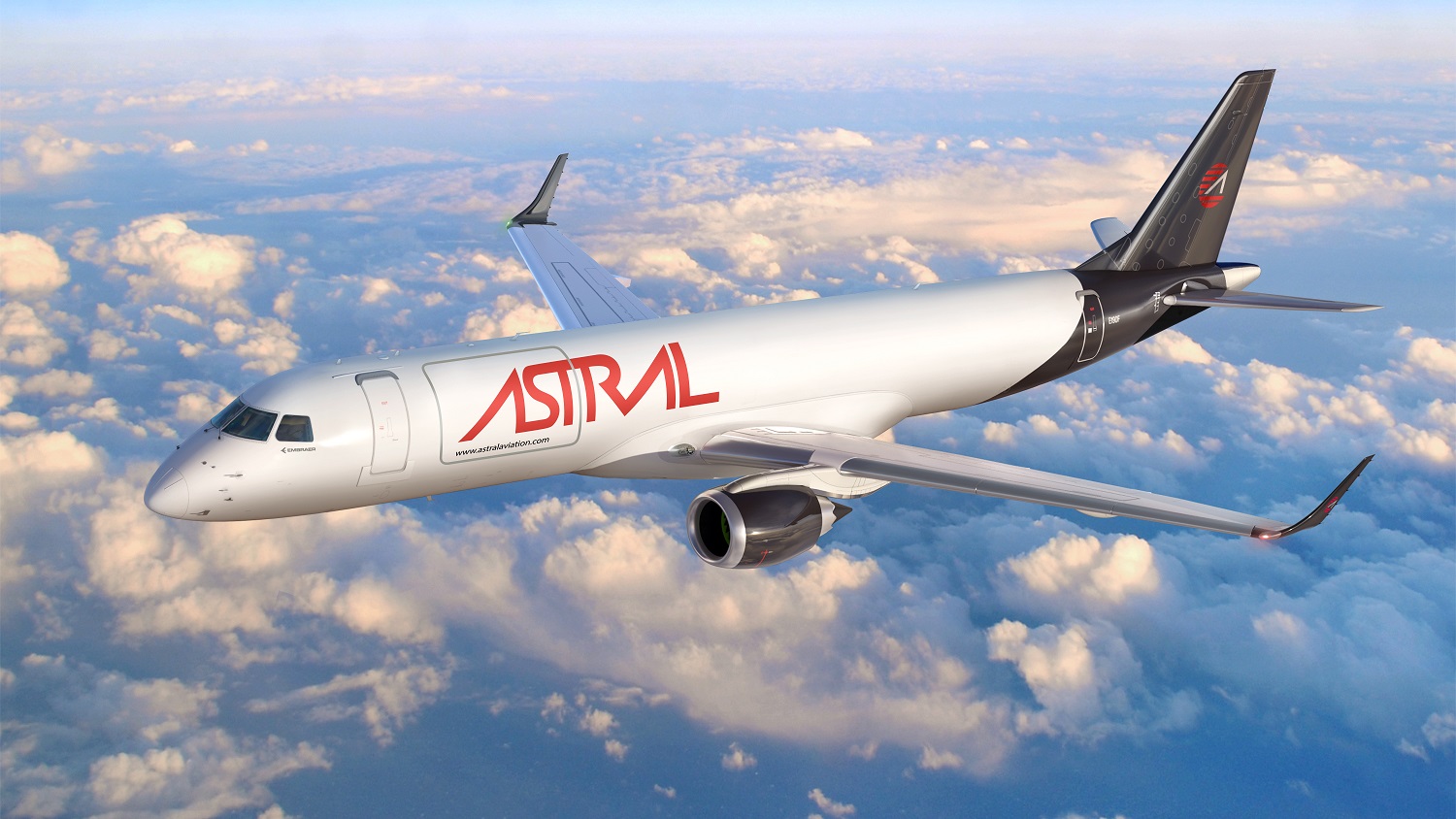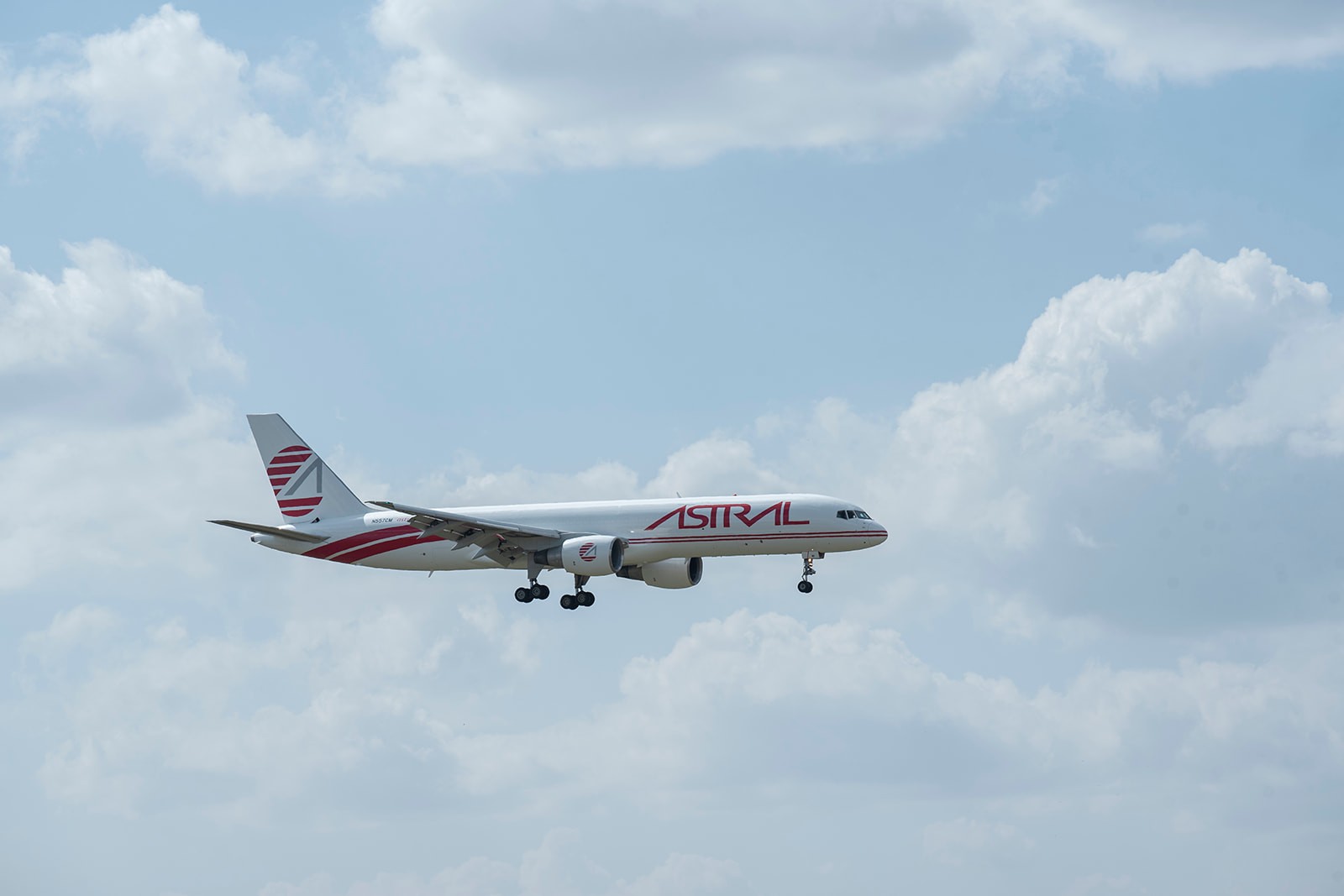Astral Aviation aims for growth
06 / 03 / 2023

Image source: Astral Aviation
Astral Aviation is pursuing freighter and drone investments to grow its cargo airline business in Africa and beyond.
Astral Aviation is setting its sights on China now that the county has relaxed its pandemic restrictions.
The Kenya-headquartered cargo airline plans to launch flights to China and add an office in the country, says Sanjeev Gadhia, founder and chief executive.
Currently, Astral flies to Hong Kong but is keen to introduce flights to China’s mainland.
The airline has set its sights on a new office in Guangzhou, but Gadhia says the Chinese government will make the final decision.
“Guangzhou is the biggest hub for Africa in China and we would love to have a base there. But everything depends on the Chinese government. They might allocate us a different city.”
China’s recovery is set to benefit Africa’s economy, Gadhia adds.
“The slowdown in China affects the whole world, but especially Africa because Africa is so dependent on China,” he says. “We are seeing less and less output (of goods) coming into Africa. If China gets back on its feet it will really help Africa in a big way.”
Astral, which has hubs in Nairobi, Dubai, Johannesburg and Liege, is also looking at the possibility of setting up an AOC in Europe, possibly Malta, says Gadhia.
He explains: “Malta offers the best value proposition to foreign airlines who would like to set up an AOC in Europe.”
However, he adds: “I feel I’m a little bit late. I wish I’d set up the AOC in Malta a year ago. But I think we’ll start the journey this year.”
Freighter investments
As well as expanding its geographical presence, Astral aims to double its fleet size in the next three years.
The airline currently operates a fleet of F50 (7 tons), DC9F (15 tons), B727-200F (22 tons), B757F (30 tons), B767-200F (42 tons) and B747-400F (110 tons) aircraft within its intra-African, Middle East, Asian and European network. The airline has invested in three Boeing B757-200s.
Two of these B757-200s became operational last year and the third was delivered in January.
“With the arrival of the 757s we hope to get into Tel Aviv twice a week and into Saudi Arabia twice a week. We are opening up Africa to new markets – we are already expanding our capacity to Hong Kong.”
Astral has also ordered two B777Fs, with two additional options in its order.
Furthermore, the airline is also acquiring Airbus freighters for the first time, says Gadhia.

Astral Aviation will be the operator of the first two Embraer E190F P2F conversions. Photo: Embraer
Six passenger-to-freighter (P2F) conversions will be leased to recently established cargo airline Pradhaan Air Express in New Delhi, India, he explains.
“We’re looking at two A320P2Fs, two A321P2Fs and two A330-300P2Fs. All six aircraft are going to be operating out of India.”
Singapore-based ST Engineering, which operates a freighter conversion joint venture with Airbus and Elbe Flugzeugwerke (EFW), was contracted to undertake the A320P2F conversions.
ST Engineering Aerospace Resources leased the aircraft to Vaayu Aero Leasing, which subsequently leased the aircraft to Astral, which then sub-leased the conversions to Pradhaan Air Express.
Gadhia says Pradhaan Air Express started flying the first A320P2F in the last quarter of 2022. The second A320P2F has also now been converted.
Astral intends to use its planned European AOC to host the Airbus fleet in an effort to try and mitigate the risk of having too many aircraft of different types in Kenya, says Gadhia.
Notably, the country is traditionally Boeing-orientated, which would make it harder to run maintenance operations on the aircraft, he adds.
In July last year, aircraft leasing company Nordic Aviation Capital (NAC) signed a memorandum of understanding (MoU) to place the first ever two Embraer E190F conversions with Astral.
Both aircraft will enter the conversion process in the first quarter of 2024 and are expected to be ready by the third quarter of 2024.
“Africa is a perfect launchpad for the Embraers. It’s amazing to be the first airline that will fly the conversions,” says Gadhia.
He confirms if these aircraft work well in the fleet, Astral may invest in more in the future.
He adds: ”When an airline makes a passenger aircraft there should always be a Plan B where the aircraft can evolve to be a cargo aircraft.”
He expects this to become more common in the future, which will increase competition in the cargo aircraft market, as well as offer more choice, he points out.
Furthermore, he believes more conversion facilities and infrastructure is needed in Africa.
“Africa needs its own conversion facility. So does the Middle East, and so does Asia, and we feel that there has to be more conversions to fulfil the demand that is evolving due to changing efficiency and sustainability requirements.
Gadhia doesn’t think aircraft overcapacity will be a problem and believes the current rates of conversions will be sustained.
Power of partnerships
Partnerships are important to Astral’s development, says Gadhia. “The heart of Astral will always be in Africa, but we are on a journey to become a global airline.
“We believe that the Africa region can only be successful if we go global, bringing freight from all over the world into Africa.
“China, India, the Middle East and Europe will always be very strategic for us. The US not directly, but indirectly by collaborating with other US airlines.”
“Collaboration is very important,” he adds. “We have 40 interline partners, and we want to go interline with almost every airline in the world.”
Etihad Cargo and Astral signed an MoU in February that will see Etihad Cargo benefit from cargo capacity out of Nairobi via the introduction of additional services from Nairobi to Etihad Cargo’s hub in Abu Dhabi from April 1.
The agreement will see Astral and Etihad Cargo sharing up to 50% of all available capacity on the new Nairobi-Abu Dhabi-Nairobi flights.
Also in February, the cargo division of Kenya Airways (KQ Cargo) and Astral signed a codeshare agreement to support air trade flows between Africa and the Middle East.
KQ Cargo put codeshare flight numbers on Astral flights operating from Dubai in the UAE into both carriers’ hub at Jomo Kenyatta International Airport, Nairobi.
The previous month, Astral appointed Air Logistics Group as GSSA in Europe, the UK and US to support growth in these regions in 2023.
Drone zone
In addition to freighters, Astral expects cargo drones to play an important role in Africa.
Astral’s Kenya-based subsidiary Astral Aerial Solutions is already flying “agritech” drones to assist the agriculture industry in Kenya and throughout Africa, says Gadhia.
“Kenya has a very diverse agricultural economy. We’re using our drone technology to improve yield for farms in Africa.”
Astral Aerial Solutions now aims to offer cross-border drone solutions for transporting cargo in dangerous situations and last-mile delivery.
“The company plans for last-mile delivery drones to pick up cargo from Nairobi Airport and transport it to more remote areas.
“That’s where we need them – to operate into remote, inaccessible airstrips/areas which may be dangerous.”
He adds: “The problem we have in Africa is that from the airport to the last mile it can take days and weeks.
“The idea is to reduce the time for the consumer to receive goods.”

Astral Aviation B757-200F. Photo: Astral Aviation
The business is looking to invest in cargo delivery drones and is currently in talks with several global drone companies.
Last year, it signed a letter of intent (LOI) with Natilus for its 3.8 ton payload short-haul feeder UAV.
In September 2022, Reliable Robotics and Astral began working together to develop operational, regulatory, and business plans to launch automated aircraft operations.
Reliable Robotics is working with the US Federal Aviation Administration (FAA) to certify its automation system on the Cessna 208 Caravan, and to begin commercial cargo operations in the US.
The partners said the collaboration will enable the subsequent international expansion into Africa where the Caravan is an essential utility aircraft with nearly 350 currently operating across the continent.
Looking for liberalisation
One of the unique challenges of operating cargo aircraft in Kenya and Africa is a lack of liberalisation, says Gadhia.
“This is a big problem. Africa needs more liberalisation. We have to provide a chance for African airlines to benefit from intra-African opportunities.”
He says there are certain initiatives, like the Single African Air Transport Market (SAATM), which are helping, plus Astral is lobbying with the African Airlines Association (AFRAA), and African unions.
“Africa must first open up to itself before opening up to the rest of the world. A lot of countries have opened up. Kenya is a prime example. But unfortunately, a lot of other countries are still closed.”
The high cost of taxes is another barrier to growth, he says. “There are many taxes for cargo, including for fuel and handling, which are camouflaged in different ways.
“So, we’re operating in a really high-cost environment where the consumer is the one who loses out in the end.
“If you reduce your costs and open up with liberalisation, there will be positive GDP growth and an increase in employment.”
Future prospects
Astral expects the e-commerce and perishables markets to continue to thrive.
“E-commerce and perishables are here to stay. Demand for food perishables is very high and increasing. We’re expecting 20% year-on-year growth.”
In terms of overall demand in 2023, Gadhia says: “We expect to start seeing an improvement in demand in the second quarter.
“We expect that it will be difficult here because of the uncertainty of growth – with the underlying factors of the Ukraine war and effects of recession in Europe.”
But he is positive about Astral’s own prospects overall. In addition to growing its fleet to better connect Africa and reduce transit times, Astral is “open to looking at the possibility of the Flexport model”.
Adopting this would allow Astral to have alliances with shipping lines and rail and road companies to offer an end-to-end solution.
“We are studying it. It’s a very sensitive topic because it upsets a lot of our key partners,” he adds.














